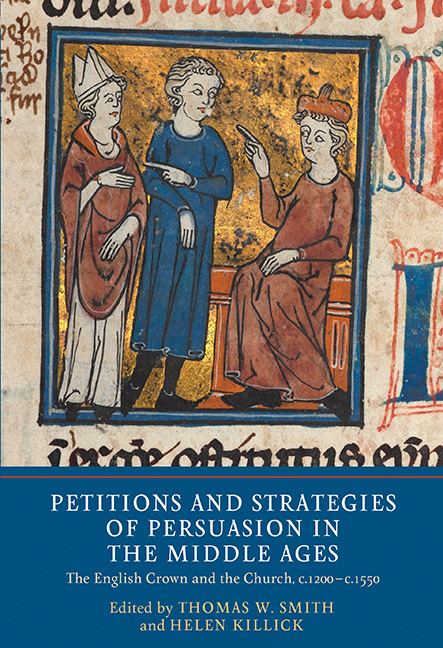 Petitions and Strategies of Persuasion in the Middle Ages
Petitions and Strategies of Persuasion in the Middle Ages Book contents
- Frontmatter
- Dedication
- Contents
- Contributors
- Foreword
- Acknowledgements
- List of Abbreviations
- Introduction: Medieval Petitions and Strategies of Persuasion
- 1 Blood, Brains and Bay-Windows: The Use of English in Fifteenth- Century Parliamentary Petitions
- 2 Petitioners for Royal Pardon in Fourteenth-Century England
- 3 The Scribes of Petitions in Late Medieval England
- 4 Patterns of Supplication and Litigation Strategies: Petitioning the Crown in the Fourteenth Century
- 5 Petitions of Conflict: The Bishop of Durham and Forfeitures of War, 1317–1333
- 6 A Tale of Two Abbots: Petitions for the Recovery of Churches in England by the Abbots of Jedburgh and Arbroath in 1328
- 7 ‘By Force and Arms’: Lay Invasion, the Writ de vi laica amovenda and Tensions of State and Church in the Thirteenth and Fourteenth Centuries
- 8 The Papacy, Petitioners and Benefices in Thirteenth-Century England
- 9 Playing the System: Marriage Litigation in the Fourteenth Century
- 10 Killer Clergy: How did Clerics Justify Homicide in Petitions to the Apostolic Penitentiary in the Late Middle Ages?
- Index
9 - Playing the System: Marriage Litigation in the Fourteenth Century
Published online by Cambridge University Press: 20 August 2020
- Frontmatter
- Dedication
- Contents
- Contributors
- Foreword
- Acknowledgements
- List of Abbreviations
- Introduction: Medieval Petitions and Strategies of Persuasion
- 1 Blood, Brains and Bay-Windows: The Use of English in Fifteenth- Century Parliamentary Petitions
- 2 Petitioners for Royal Pardon in Fourteenth-Century England
- 3 The Scribes of Petitions in Late Medieval England
- 4 Patterns of Supplication and Litigation Strategies: Petitioning the Crown in the Fourteenth Century
- 5 Petitions of Conflict: The Bishop of Durham and Forfeitures of War, 1317–1333
- 6 A Tale of Two Abbots: Petitions for the Recovery of Churches in England by the Abbots of Jedburgh and Arbroath in 1328
- 7 ‘By Force and Arms’: Lay Invasion, the Writ de vi laica amovenda and Tensions of State and Church in the Thirteenth and Fourteenth Centuries
- 8 The Papacy, Petitioners and Benefices in Thirteenth-Century England
- 9 Playing the System: Marriage Litigation in the Fourteenth Century
- 10 Killer Clergy: How did Clerics Justify Homicide in Petitions to the Apostolic Penitentiary in the Late Middle Ages?
- Index
Summary
Medieval English courts have preserved an astounding amount of information. A staggering volume of high-quality summaries of narratives presented in the theatre of the court by witnesses and litigants can be compared with an equally impressive set of procedural documents. The narratives frequently contained exquisitely detailed narratives of apparent verisimilitude and have provided the evidence behind a multitude of studies of medieval everyday life.
Most of these studies have implicitly taken for granted that the court record represents a more or less true image of the events under legal scrutiny. Only a few historians, most notably Natalie Zemon Davis, have attempted to explore these records as part of a fluid and constantly changing narrative strategy intended to further the interests of a particular party in a dispute. In two brief, but eminently readable, studies, Davis has shown that litigants were aware of the need to present their cases in a way that maximised their chances of survival or of the continued success of a loved one left behind. Her careful analysis of the legal choices faced by defendants as cases progressed through the courts shows the importance of a detailed scrutiny of the records in their entirety. Accordingly, in addition to the mere words preserved in the record, a thorough analysis should include, inter alia, a consideration of the social circumstances of the litigants, the timing of interventions and the avenues that legal procedure opened (and closed) as a case moved through the legal systems.
Davis's work focused on cases that involved the death penalty and, so far, only a few scholars have successfully integrated Davis's insight into their analyses of less high-stakes types of cases. This is a pity because a more careful reading of such cases suggests that a much more complex understanding of the law could be found among ordinary people and should instil a healthy scepticism about the veracity of depositions among those who investigate medieval everyday life. In this chapter I shall investigate the records of four much more mundane cases of litigation in the fourteenth-century consistory court in York: the York Cause Papers, preserved at the Borthwick Institute for Archives.
- Type
- Chapter
- Information
- Petitions and Strategies of Persuasion in the Middle AgesThe English Crown and the Church, c.1200–c.1550, pp. 185 - 201Publisher: Boydell & BrewerPrint publication year: 2018


